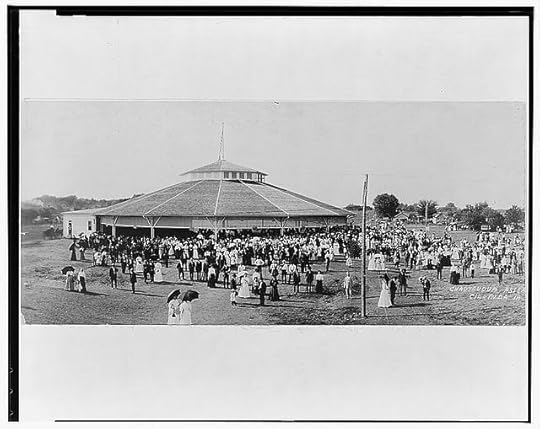Colleen Mondor's Blog, page 6
July 14, 2014
A must buy picture book!
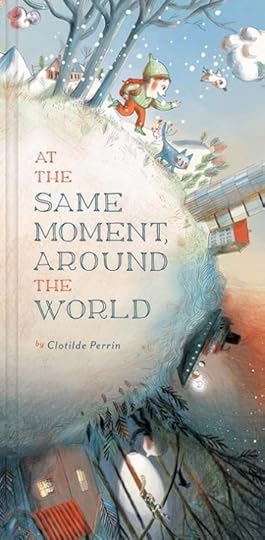 Clotilde Perrin uses a smart idea to show how similarly people live around the world in this stunning (stunning!!!) picture book. Starting at 6AM in Dakar, Senegal, she takes young readers into the lives of children on six continents as they eat, drink, go to school, play and sleep all at the same hour of the day. So, while a child is waking up in Senegal, another is sound asleep in Brazil. This helps get the notion of time zones into the heads of early readers (and Perrin's informational notes at the end help as well.)
Clotilde Perrin uses a smart idea to show how similarly people live around the world in this stunning (stunning!!!) picture book. Starting at 6AM in Dakar, Senegal, she takes young readers into the lives of children on six continents as they eat, drink, go to school, play and sleep all at the same hour of the day. So, while a child is waking up in Senegal, another is sound asleep in Brazil. This helps get the notion of time zones into the heads of early readers (and Perrin's informational notes at the end help as well.)
Mostly though, while At the Same Moment Around the World is an educational book it is also a beautiful one and a chance to learn some geography (includes a map at the end) and see how much alike children and families are around the world.
Perrin takes readers from Keita in Senegal to Benedict in Paris then Mitko in Sofia, Bulgaria, Yasmine in Baghdad, Nadia in Dubai, Ravshan and Yuliya in Samarkand, Uzbekistan, Lilu near Mount Everest, Khanh in Hanoi, Vietnam, Chen in Shanghai, Keiko in Tokyo, Kate traveling between Ayers Rock and Sidney, Matea and Joany in New Caledonia, Ivan in Anadyr Russia, Abby in Samoa, Allen and Kiana in Honolulu, William in Anchorage, AK, Sharon and Peter in San Francisco, Samantha in Phoenix, Pablo in Mexico City, Diego (just born!) in Lima, Peru, Ana in the Amazon rainforest in Brazil, Lexi in Nuuk, Greenland, Antonio on the island of Fernando de Noronha and finally to Chloe onboard a ship in the middle of the Atlantic.
They are all living different lives and yet doing similar things. They are different colors, in different clothes in different landscapes (and different beds) but still, they are all the same and they are all living in the same moment. Perrin thus gives her readers not only something to learn from and think about but also a great lesson in the diverse face of humanity.
I call this a win on every possible level and a book that will be appreciated by adults and children alike.
For another look, Jules reviewed At the Same Moment Around the World for Kirkus in her column there and then followed up at her blog with some more interior spreads from the book.

July 11, 2014
Unmentionables by Laurie Loewenstein
Unmentionables begins with a bit of a bang as main character Marian Adams presents a speech to the fine Midwestern folk of Emporia on the impossibility of women's undergarments. In 1917 this is indeed an "unmentionable" topic and yet as Marian speaks, it makes perfect sense--women are literally being dragged down to the ground by the clothing society requires them to wear. How can they ever succeed? How they can achieve anything when it takes so much simply to move around?
Marian's comments are received differently by those in attendance, although as part of the weeklong traveling Chatautauqua assembly, they are accustomed to being challenged now and again by a few outrageous (to them) ideas. The idea is that someone like Marian will drop into their lives, share her opinions and then move on to the next town. Marian stumbles while climbing off the stage however and severely sprains her ankle. She ends up spending several days in Emporia and lives, including her own, are upended by this intrusion.
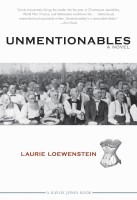 In many ways, Unmentionables is a standard smalltown drama. There is the newspaper editor, a widower, and his difficult relationship with his wealthy father-in-law. His grown stepdaughter is desperate to break out on her own but her grandfather insists on keeping her under his thumb. The next door neighbors (brother and sister) are tangled up in their issues; she has an unrequited love for the newspaperman and he is a rather fickle businessman who owes a debt that he does a poor job of paying attention to.
In many ways, Unmentionables is a standard smalltown drama. There is the newspaper editor, a widower, and his difficult relationship with his wealthy father-in-law. His grown stepdaughter is desperate to break out on her own but her grandfather insists on keeping her under his thumb. The next door neighbors (brother and sister) are tangled up in their issues; she has an unrequited love for the newspaperman and he is a rather fickle businessman who owes a debt that he does a poor job of paying attention to.
The rest of the town is filled with people good and bad, there is generosity and pettiness and, in this time of war, some startling cruelty. Page by page, Loewenstein tosses out much of the difficult times, truly immersing her readers in the cares of 1917. She also shows deep affection for her characters, especially Marian, "Deuce" and Helen, who dreams of joining the suffragist cause.
This is a period that begs for great sweeping novels and I was especially happy to lose myself in the lives of these interesting people. The whole notion of Chautauqua and the "adult improvement" period appeals to me (traveling speakers under huge tents!). There were so many ideas, good and bad, swirling about the world in that time, questions that had to be considered and great strides about to be taken. Just think of the layers of clothing women wore in 1917 and then how much of that changed by 1927. The world was spinning so fast in the teens - women about to vote!!! Yet Lowenstein brings it all down to a level that makes the issues sharply personal. And then Marian goes to France to make her mark and that is some daring stuff as well.
(I especially liked that she carried Emporia with her even to France and the letters exchanged between the two places are a lovely touch.)
I found a certain amount of "earthiness" to this novel--a perspective on life that reads very much about people most readers know and will recognize. There are heroes and villains (plus a dog that dies to prove just how dastardly one villain truly is which, as you know, I hate to find any novel), and some hard won victories. I think I especially liked the history here though, how Lowenstein so effectively weaves bits about milk inspection and disease and racism and education into the overall story. This is how we live, after all, with so much big and small going on around us.
[Post pic of Chautauqua Assembly in Clarinda, Indiana circa 1908. Courtesy Library of Congress.]

July 7, 2014
Wherein my family story is upended by a new truth
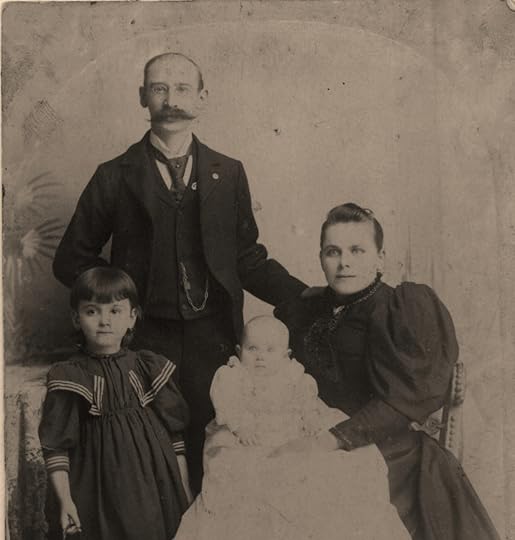 One of the foundational stories in my mother's family is that of my great grandmother Julia's immigration from eastern Europe. Growing up, I was told many many times of the miracle of her survival as a small baby while traveling from Hungary (or Austria or the Hungarian Empire--we were a little fuzzy on that), to New York City. Her mother Maria Falk was a teenager, her father was unknown and Julia was only a few months old. They arrived in either late 1890 or early 1891.
One of the foundational stories in my mother's family is that of my great grandmother Julia's immigration from eastern Europe. Growing up, I was told many many times of the miracle of her survival as a small baby while traveling from Hungary (or Austria or the Hungarian Empire--we were a little fuzzy on that), to New York City. Her mother Maria Falk was a teenager, her father was unknown and Julia was only a few months old. They arrived in either late 1890 or early 1891.
There were many things about this story that I found fascinating, from how Maria paid for their passage to the identity of the man who got her pregnant and abandoned her. (My mother and I wistfully decided she must have been taken advantage of by royalty of some kind.) Julia never expanded much on the story; if she knew anything else it was not revealed to my grandmother or her siblings. Everyone knew she was illegitimate and an immigrant and that was the end of that. I honestly never expected to learn anymore about the start of Julia's life and haven't spent much time looking.
After Maria and Julia arrived there was a gap of 5 years before we know anything concrete. In 1895 Maria married* Rudolph Pressl, a naturalized American citizen who emigrated as a child with his family from Vienna. Later that year the first of their 3 daughters was born. Rudolph died sometime between the 1900 and 1910 censuses. I have many pictures of Julia and her sisters, Ernestine, Marie & Carol who worked in the garment industry before they were married.
Although I have researched my family tree quite a bit over the years, most of my focus has been on Julia's husband Tom, my great grandfather, and his family. I do have a copy of Maria & Rudolph's marriage certificate from NYC however and a little while ago I came across it and noticed that Maria had signed the back and her maiden name was not Falk as we thought. She signed the form Maria Filak. This was different from the maiden name listed for her mother on Julia's marriage certificate in 1910. (My grandmother repeated the error when providing info for Julia's death certificate in 1972.) Looking at Maria's signature, I wondered if a clerk's error on Julia's marriage certificate had given us bad information for all these years and we just never paid attention to it. I decided to look a bit for Maria Filak.
I went to the immigration records on ancestry.com. (I sound like a commercial for the site, but it's true.) There was only one Maria Filak listed on a ship's manifest but she didn't fit what I knew of the family history so I didn't get too excited. I went back and searched every census record (federal and state) for Maria Pressl from her 1895 marriage to Rudolph until her death in 1934. (Maria does not appear in a census prior to that under Filak or Falk.) In every one I noted her age at the time and saw that she shifted her year of arrival in the US on every form from 1890 to 1893 to 1894. Her birth was consistently in October 1872 however. (This also matches the age on her marriage certificate to Rudolph.) Then I went back to the immigration records with this date and there was no longer any denying what I found there.
Maria Filak, age 15, arrived in NYC on the SS Eider from Bremen, Germany via Southhampton, England on April 24, 1886. Her country of origin was Hungary. She was 15 years old and alone. My great great grandmother was in America 4 years before we thought and more importantly, 4 years before my great grandmother was born.
Julia, apparently, was born in New York City.
I don't know why Maria told the family the story she did. I don't know why it was so important that Julia be presented as an immigrant baby. Maria never hid the fact that she was an unwed mother--she lists herself as "single" on her marriage certificate to Rudolph--but apparently there was something to the immigration story that needed to be altered to fit her life. Now I have Maria here four years earlier than we knew, Julia born in the city and the wedding still 5 years later. How Maria survived all those extra years and how Julia came to be born is a total mystery. I don't know if I will find out more about those years or ever get the name of my great great grandfather, but this is still something.
Julia Filak Pressl was American-born, which plants our feet even deeper in the American story. That alone, is really pretty damn cool.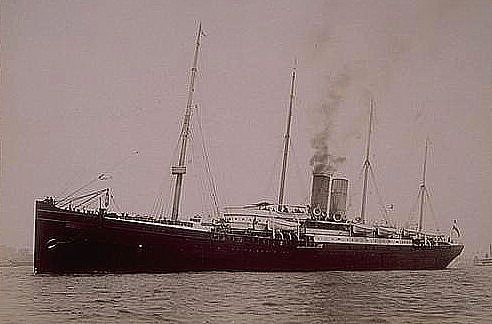
*Maria & Rudolph were married in January; their first daughter Ernestine was born in June.
[Post pics: Maria & Rudolph Pressl with daughter Julia (standing) and new baby Ernestine, taken late summer/fall 1895. Julia was almost or just turned 5-her birthday was September 14. I think this is the baby's baptismal photo. The ship is the SS Eider, which brought my great great grandmother to America. More info on it here.]

"Be invested in the idea of ordinary life."
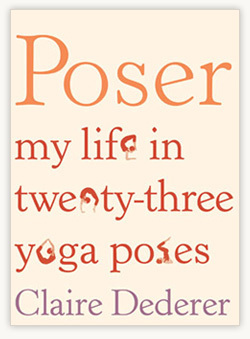 When I attended Claire Dederer's session on language and memoir at the Chuckanut Writer's Conference, I greatly enjoyed the many ways in which she used basic words to show us how we could create beautiful sentences. It was a very funny and thoughtful session, with lots of audience participation which was great. I'm sure she is an excellent teacher as she taught us quite a bit in a very short period.
When I attended Claire Dederer's session on language and memoir at the Chuckanut Writer's Conference, I greatly enjoyed the many ways in which she used basic words to show us how we could create beautiful sentences. It was a very funny and thoughtful session, with lots of audience participation which was great. I'm sure she is an excellent teacher as she taught us quite a bit in a very short period.
From my notes I have the importance of "story, scene, honesty and language". We were urged never to use general past tense "we used to" or "we would" and to take the general and make it specific. (Don't write that "we would go to the park" but rather, "I got on my bike on long sunny days and rode on cracked sidewalks everyday that summer with my best friend Susie to the park....")
See the difference?
I thought about language as Claire talked and also about honesty in writing (the importance of emotional honesty was a big topic of discussion). Lots of folks asked questions and batted around ideas, feeding off of each others answers. It was all quite unexpectedly exhilarating and I walked out the door and promptly placed myself at the nearby bookstore table and bought a copy of her book Poser: My Life in Twenty-Three Yoga Poses.
I do not practice yoga. I am impressed by folks who can do it well but I've always been more partial to other forms of exercise. So I wouldn't normally want to read a book that is framed around yoga. But Claire was interesting and that made me want to read the language she chose for her book. I flew through it and now have a much better understanding of what yoga requires. More importantly, I have a grasp on the power of personal stories.
One of the things we talked about in the session was the power of an ordinary life and Poser, like many memoirs, is about just that. In the book, Claire writes of how she and her husband are freelance writers in Seattle and both have roots in western Washington. They had a daughter and Claire dove headfirst into West Seattle's idea of what the good mother must do. (It's all very organic.) There were financial pressures which drove her husband into depression, the trauma of their daughter's difficult birth, friends and family who dropped in and out and the endless confusion over her parent's who had been separate for more than 20 years but resisted divorce. It's all very ordinary and yet wildly compelling.
The yoga framework carries readers along in an orderly manner as Claire reaches back to her confused and sometimes frustrating childhood and then steps into the present and the ever-growing chaos there. Slowly she works through many questions about her life and as I read the book I realized how common her experience truly was, even with a decidedly non-yoga practicing reader. I did not share her path in mothering, nor was I a freelance writer but still....I got this book in a big way. There's one line of many that caught me as she pondered how much of her time was going into her infant daughter's care. She writes:
"But I could feel my worth as a worker slipping away, month by month and year by year."
It's okay to feel that way; I have certainly felt that way and it is a bit of the essence of the book. It's about women and family and being a child of a loving but broken home (which is broken even when both parents remain 100% in your life) and about figuring out what kind of parent is the kind of parent you want to be and what kind of spouse and what kind of worker and what kind of creative and even what kind of yoga practitioner.
It's coming-of-age for grown-ups which I think, more and more, is a large bit of what most memoirs really are.
Poser is written with lovely language and it made me think. I still have no interest in attending a yoga class but I got something out of these words that is staying with me. It's the emotional honesty I think--when it's present in a text you don't forget it.

July 2, 2014
So, this whole writing conference thing worked for me
Last weekend I attended the Chuckanut Writers Conference in Bellingham, WA. I went into this with absolutely no expectations--no search for connections, no networking, no intention to attend a pitch session with a publisher or agent. All I wanted to was to listen to the faculty (all of whom sounded interesting) and maybe through the sessions and presentations find my way around some issues with my current projects.
Here's the thing--I have not been writing like I should. It's very hard to juggle creative writing and job-writing. I have spent a lot of time reviewing and working as a journalist over the past few years since The Map of My Dead Pilots went through its final edits & was published. I wrote a lot of short things since then, some essays and a short story, but the next book has been a problem. I've been floundering for no good reason, so I decided to attend Chuckanut and see if I could gain some much needed perspective (and possibly direction).
In addition to attending all the presentations, which were alternately funny, thoughtful and endearing, I also attended sessions at each appointed time. I attended novelist (and magazine editor) Brian Doyle's session on finding ideas even though I already know what I want to write about. I attended memoirist Claire Dederer's session on language in memoir even though I have already written a memoir. I attended a panel discussion with novelist Jim Lynch, nonfiction writer Bruce Barcott, historian David Laskin and science writer Thor Hanson about research even though I have spent years in archives and libraries. I attended Laskin's session on writing personal narratives on family history even though I was not certain this was something I wanted to write and, finally, I attended Barcott's session on writing Op-eds even though I had never thought about writing one.
And here's the thing--I got a lot out of this conference. I got some very useful tips, some points to ponder, some ideas to follow-up on. I spent some serious time thinking about what was said around me, chatted with some interesting people and came to grips with all the questions that have been mucking up my work.
I got myself centered if that makes any sense. I figured out what I am supposed to be doing and, just as important, what I am supposed to be writing.
My only complaint about the conference is a common one for such events--some of the faculty was less available than others. It was clear to me early on that if I wanted to speak to any of them, even just to extend a compliment, I was going to have to approach them whenever I saw them and not wait around as they could be gone. So I did just that and ended up having some great conversations and, very surprisingly, getting an amazing offer of assistance on a short project (I asked for advice, I got a lot more). Everyone was nice, it's just that some of them weren't there too much. Keep than in mind when you attend a conference.
I'm going to write a bit more specifically about some of these writers and their work in the coming weeks because I want to recommend their books and articles and share some notes I took. Bottom line though, this was sort of life-changing for me and one of the more valuable experiences of my writing career.

June 27, 2014
"Before he died Klatsassin famously said, 'We meant war, not murder.'"
A pretty amazing ruling from the Canadian Supreme Court yesterday concerning Aboriginal territory in British Columbia that you might have missed. I found this whole article explaining it to be fascinating but in particular it was the history (150 years worth) that really caught my attention.
In 1864 a toll road for wagons was planned through Tsilhqot'in territory in BC to better facilitate the movement of goods to the gold fields. Many of the Tsilhqot'in protested the roadway, especially as they had an uneasy relationship with the Europeans due to the spread of smallpox from blankets. (Really.) Here's a bit on it from the article I read at Aboriginal People's Television Network:
Then, in the spring of 1864, four bags of flour were stolen from a road crew's base camp. The crew's foreman threatened the Tsilhqot'in with smallpox for stealing.
Journalist Melvin Rothenburger, who wrote a book called the The Chilcotin War, believes this threat may have helped spark the war.
"That could have been an important factor because of the fear of smallpox and it had been rampant," said Rothenburger, whose great-great grandfather Donald McLean was killed in the ensuing battles with the Tsilhqot'in.
News of the smallpox threat and rapes stirred a group of Tsilhqot'in to launch what turned into a guerilla war against the settlers. Of this group, a war chief known as Klatsassin or Lhatasassine, meaning "We do not know his name," came to embody the Chilcotin War.
They fired their first shot on the morning of April 28, 1864. It killed a ferryman who refused Klatsassin and his party passage.
After several deaths and fighting on both sides, Katassin and three other chiefs went to a proposed meeting with the BC governor. While asleep they were shackled, then summarily tried and hung on Oct. 26, 1864.
Before he died Klatsassin famously said, "We meant war, not murder."
There is much talk in Canadian media about the long fight for Aboriginal rights in BC (this latest court battle started in the early 1980s concerning timber sales on Aboriginal land). I am struck though by how the fight simmered in so many different ways and the powerful reach of history. It never fades away, no matter how long you ignore it.
History always insists on being heard.

June 25, 2014
Am I Serious Enough For You or, More Importantly, Myself?
From a conversation posted yesterday at Tinhouse between authors Lidia Yuknavitch and Kate Zambreno:
LY: Can contemporary women writers achieve literary or artistic legitimacy? On whose terms? Toward what end? This is a question that troubles me, or a question I think should be endlessly troubled...
KZ: It troubles me too. Although I can't speak for all contemporary women writers, just myself. This new idée fixe of mine--to be taken seriously as a writer--also, to someday write a truly great work, and then I will be taken seriously. But--I don't know if I will know if a work is great, perhaps that's not something I can decide or know as the writer, and perhaps these ideas of greatness or genius are oppressive terms anyway, about approaching perfection or success, when I've always been more interested in failure.
And what does that even mean--a serious work? Sometimes I feel exquisitely that if I never wrote about femininity or feminism, about emotions, especially depression and anger, never wrote from the first-person, I would be taken seriously as a literary writer, but I keep on returning to these themes in the work. I mean, there are certainly some contemporary women writers that achieve a great deal of literary legitimacy and recognition, and occasionally in the mainstream, and I think many are incredibly deserving. But I have absolutely no misconceptions that American trade publishing is a meritocracy, and in my opinion most of the important work being written in the United States today is happening in the small press, sometimes at a very micro level, and this is because the demands of the market, especially for the massive audience of women readers, are not the best recipe for prickly and urgent literature.
The question of "what is serious work" is what really captured my attention in this exchange as it is something that I think about quite frequently with my own work. In writing about aviation I am generally always serious--it's a serious topic--and yet I do not think as a literary writer of aviation I am taken very seriously. I don't mean that people dismiss my research on this subject but rather that when writing about something perceived as technical, it is easy to dismiss an author as other than literary.
Basically, writing about aviation is considered by some as more the nuts and bolts of writing and not the MFA-type of indepth analysis that literary writers appreciate. (And I won't even get into the issue of being a woman who writes about a male-dominated field.)
As a reviewer, I am granted far more respect as serious when reviewing nonfiction for adults then writing anything about YAs or children. This does not surprise me, although I wish it did.
I have felt in the past few months, that aspects of my writing (as a reviewer) have been deemed worthy of easy dismissal by others. This has left me disappointed in those who passed such casual judgements. I do not agree with their definitions of "serious" or how one must write to be deemed worthy of the title "serious writer".
It's a term that is best expressed in the eye of the beholder, I think. Just as so many other subjective terms are.
(And for the record, how anyone could deem Zambreno or Yuknavitch as anything less than serious is impossible for me to believe.)

June 23, 2014
Best Summer Song Ever.
I have seen this movie roughly a zillion times (I think it was the only thing on HBO for years). It never gets old and yes, I still know all the words.
Best.Summer.Song.Ever.

June 20, 2014
Writing Process Blog Tour
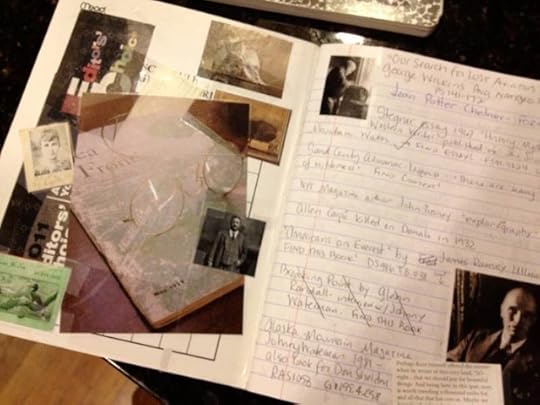
I was tagged a couple of times for this tour and had to turn down the invites, but my pal Sarah Stevenson emailed me recently & the timing was perfect. Here is Sarah's post all about her young adult writing which I highly recommend. She also helps me wrangle the crew at Guys Lit Wire, keeps this site in ship-shape condition and basically is a truly lovely person & good friend. Now onto the questions!
1. WHAT AM I WORKING ON?
I've been struggling for a bit on my next big creative project. I write a lot for my day job, all of it on Alaskan aviation topics. I have been concerned both about writing on this too much for another book and conversely, on leaving the topic as it is what I know so well. In some ways, I've been stuck. (Not blocked.) To break out of this, I'm working on essay length pieces, all of them circling around the topic of the Alaska bush pilot myth. I hope when I am done that they will fit together well, but I've decided not to worry about the whole so much anymore and focus on the parts. This has freed me up quite a bit.
2. HOW DOES MY WORK DIFFER FROM OTHERS OF ITS GENRE?
As I'm a nonfiction writer mostly, I don't really fit into the "genre" issue as such. Comparing my work to other aviation writers, I think that I'm more personal--I can't help but make aviation a personal subject. I am also less interested in what happened (although I think that's important) than in why. Generally, I am endlessly intrigued by why people make the choices they do, whether they live in the present or are part of history. I hope by unpacking the bush pilot myth I can separate myself even more from other aviation (& Alaskan) writers by looking at the darker side of a long held aviation (and adventure) myth.
3. WHY DO I WRITE WHAT I DO?
It's what I know.
I am pretty much only happy when, to some degree or another, I am writing about what I know or what personally matters to me. This is not only Alaska aviation however, nor do I want it to be only Alaska aviation. I am also deeply interested in my family history and slowly moving forward on some projects in that area as well. Again though, it is what I know.
4. HOW DOES MY WRITING PROCESS WORK?
Process is a big problem for me. My husband and I have our own business (aircraft leasing) and we work from home. We are always around each other, always working on many different things associated with the business. I also have my freelance journalism job for Alaska Dispatch and I'm always working on a couple of things for that, either by writing or interviewing or researching. My creative work gets bounced aside by all this ALL THE DAMN TIME.
I hate that.
One of the biggest struggles I have is to make creative work a priority. When it happens, it happens at night (I've always been a night person) and with familiar television in the background (all seasons of Gilmore Girls currently). I have a notebook (Field Notes) with me for notes all the time and I believe strongly in taking notes. I have a basic composition notebook where I keep bigger research notes and images that strike a chord. All of this, in bits and pieces that make little sense to others, is part of my process. Mostly, I just keep trying to move forward.
5. AND THE OTHER PART OF THIS QUESTION, HOW DOES MY WRITING PROCESS NOT WORK?
I don't get enough done. I get scared. I get tired. I give up too easily. All the things that writers say about not getting the job done, are true for me. I believe very strongly that writing is not hard work; I come from people who knew hard work their whole lives. I've loaded airplanes at 20 below zero and I know that is hard work. But writing is very frustrating work and I let it frustrate me far too often. 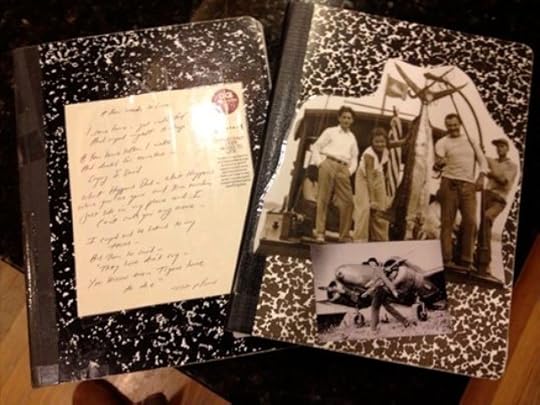
PASSING THE TORCH, OR WHO'S NEXT:
I completely forgot about this bit. Partly inspired by Kelly Fineman's downsizing posts, I have been on a tear recently going through the house for a massive neighborhood garage sale. We are having it tomorrow and this week in particular has been about scouring closets, pouring over bookshelves and pricing like a madwoman. I put this post together but completely forgot the asking others to participate bit. I point you to Sarah's recent post again and also, delightfully, to Kelly's many writing posts. My friend Gwenda Bond has also done the Writing Process Post thing and it is good reading. Finally, Jenny D. never fails to inspire me with her hardcore, get to work, crazy organized writing posts. They will all inspire you I'm sure.
[Post pics of my 2 composition notebooks.]

June 18, 2014
"A Letter to Fairbanks" on NPR's State of the Re-Union
Impressive episode on the Interior including sound and silence in Denali, the saga of "the Fairbanks Four" and life at Crazy Dog Kennels. You can hear my "Letter to Fairbanks" at the 47 minute mark. For the record, I have never been a bush pilot, I am a former aircraft dispatcher who worked for a bush commuter (and wrote about it) based in Fairbanks. I suppose "bush pilot" sounds a lot sexier though.
You can read my full letter (it got edited just a bit) here. I now cover Alaska aviation for Alaska Dispatch.


